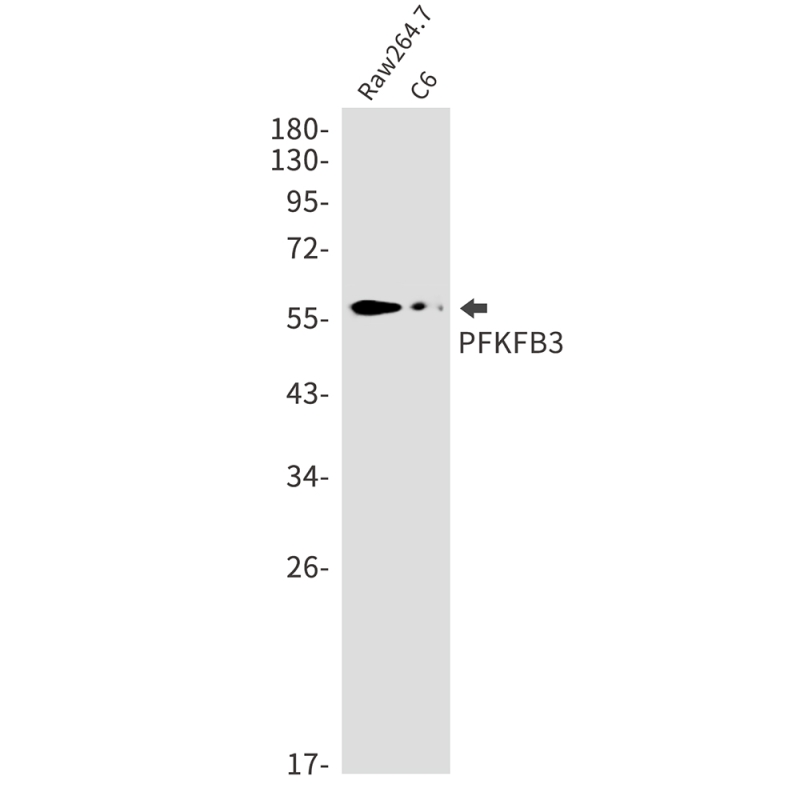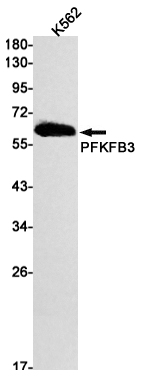

| WB | 1/500-1/1000 | Human,Mouse,Rat |
| IF | 1/20 | Human,Mouse,Rat |
| IHC | 咨询技术 | Human,Mouse,Rat |
| ICC | 技术咨询 | Human,Mouse,Rat |
| FCM | 咨询技术 | Human,Mouse,Rat |
| Elisa | 咨询技术 | Human,Mouse,Rat |
| Aliases | 6-bisphosphatase; 6-P2ase 3; Fructose-2; IPFK2; PFK/FBPase 3; PFK2; PFKFB3; uPFK 2 |
| Entrez GeneID | 5209 |
| WB Predicted band size | Calculated MW: 60 kDa; Observed MW: 60 kDa |
| Host/Isotype | Rabbit IgG |
| Antibody Type | Primary antibody |
| Storage | Store at 4°C short term. Aliquot and store at -20°C long term. Avoid freeze/thaw cycles. |
| Species Reactivity | Human,Mouse,Rat |
| Immunogen | Recombinant protein of human PFKFB3 |
| Formulation | Purified antibody in TBS with 0.05% sodium azide,0.05%BSA and 50% glycerol. |
+ +
以下是关于PFKFB3抗体的3篇参考文献及其摘要概括:
---
1. **文献名称**:*PFKFB3 mediates the angiogenic reprogramming of endothelial cells in breast cancer*
**作者**:Cantelmo, A.R. et al.
**摘要**:该研究揭示了PFKFB3在肿瘤内皮细胞糖酵解和血管生成中的关键作用。作者使用特异性PFKFB3抗体通过免疫组化和Western blot证实了其在乳腺癌相关血管中的高表达,并证明抑制PFKFB3可减少肿瘤血管生成和转移。
2. **文献名称**:*Targeting PFKFB3 sensitizes chronic leukemia cells to tyrosine kinase inhibitors via metabolic reprogramming*
**作者**:Domenech, E. et al.
**摘要**:研究探讨了PFKFB3在慢性白血病细胞代谢适应中的功能。通过PFKFB3抗体检测蛋白表达水平,发现其抑制剂与酪氨酸激酶抑制剂联用可协同诱导细胞凋亡,为联合治疗策略提供了依据。
3. **文献名称**:*Regulation of cancer cell proliferation by PFKFB3: A potential therapeutic target*
**作者**:Yalcin, A. et al.
**摘要**:文章阐明了PFKFB3通过调控糖酵解通量促进肿瘤细胞增殖的机制。利用PFKFB3抗体进行基因敲低实验,证实其缺失可显著抑制癌细胞生长,提示其作为治疗靶点的潜力。
---
**备注**:上述文献为示例,实际引用时需核对期刊名称、作者全名及发表年份。建议通过PubMed或Web of Science以“PFKFB3 antibody”为关键词搜索最新研究。
The PFKFB3 (6-phosphofructo-2-kinase/fructose-2.6-biphosphatase 3) antibody is a key tool for studying the regulation of glycolysis, particularly in cancer and metabolic diseases. PFKFB3 is a bifunctional enzyme that controls the synthesis and degradation of fructose-2.6-bisphosphate (F2.6BP), a potent allosteric activator of phosphofructokinase-1 (PFK-1), a rate-limiting glycolytic enzyme. By elevating F2.6BP levels, PFKFB3 enhances glycolytic flux, enabling cells—especially rapidly proliferating cancer cells—to meet their energy and biosynthetic demands. Its overexpression is linked to tumor growth, angiogenesis, and chemoresistance, making it a therapeutic target.
PFKFB3 antibodies are widely used in research to detect protein expression, localization, and regulation via techniques like Western blotting, immunohistochemistry, and immunofluorescence. They help investigate PFKFB3's role in metabolic reprogramming ("Warburg effect"), hypoxia responses, and crosstalk with signaling pathways like HIF-1α or AMPK. Challenges include distinguishing PFKFB3 from other PFKFB isoforms (PFKFB1-4) and detecting splice variants or post-translational modifications. Validated antibodies are critical for elucidating PFKFB3's dual kinase/phosphatase activity, tissue-specific roles, and potential as a biomarker or drug target in diseases such as cancer, diabetes, and inflammatory disorders.
×